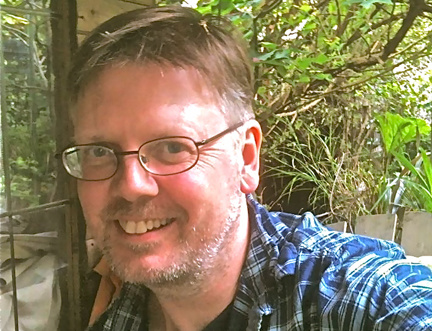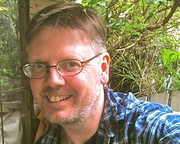Thistle Street 1995
By Paul Magrs

In 2018, we commissioned 51 authors from 25 countries to write essays exploring ideas about freedom for The Freedom Papers, a publication produced in partnership with Gutter Magazine. Read on for Paul Magrs' essay, and visit guttermag.co.uk to purchase a copy of The Freedom Papers.
This was where I was more free than I’ve ever been.
We went to live in a tiny flat in the corner of the fourth storey of a warehouse on Thistle Street. Our windows were level with the streetlights and the only way in or out was a rickety fire escape up a narrow cobbled alleyway. At first it was dizzying, but by the end of summer 1995 we took it in our stride, running up and down those steps without even thinking about it.
My flatmate was Amanda, a friend I’d made in our university town of Lancaster. She was finishing her MA, I was writing up my PhD thesis. It got to the summer and we decided suddenly we didn’t want to live as students in our northern English town any more: we wanted to live in a proper big, European city…
In that tiny flat our two closest shops were Oddbins and James Thin, where they sold every single newspaper and magazine published anywhere in the world. Our nearest café was Cyberia, where for a pound an hour you could paddle in – rather than surf – this strange new thing they called the Web.
Down on Hanover Street there were glorious smells erupting from homely Italian restaurants. We couldn’t afford to eat in them, but we could sit on top of our fire escape and sniff the gorgeous reek rolling by. Same with the aroma of hops hanging over the town. The smell that defined the place. We always found money for beer, it seemed.
And we drank in the Blue Moon. The queer café on Broughton Street, in the pink heart of the city’s Gay Triangle. It was staffed by a shifting cast of glamorous Australians and open all night. Its walls painted the darkest of blues, serving nachos and burgers and pints of fizzy lager all day and all night.
It was the summer that Easy Listening came back. We were ironic 1990s kids and so when we went out it was to clubs playing ancient tunes on vinyl. We dressed in clothes from charity shops, denim and bright nylon, wigs and feather boas. The music was by the Tijuana Brass and the James Last Orchestra. In our twenties we recycled the trash of the past and danced in funny venues: cinema foyers and empty shopping centres.
My eyes boggled all that first summer. I was dizzy with freedom and lager and running up and down that fire escape twenty times a day…
I could afford to live because I had sold my first novel. Marked for Life had been bought by Chatto and Windus for less money – my editor told me – than they’d spent on champagne at the launch of their new biography of Virginia Woolf, but it was enough to keep me going for a few months.
I was a writer in the city. I was everything I’d ever wanted to be since I’d read Goodbye to Berlin when I was 19. I was that camera, swooping round the city and recording absolutely everything. This was the summer I really taught myself to write, I think. And I did it in the simplest way possible. I wrote about anything that came into my head, and I did it for about ten hours every day. I kept the journals I’d always wanted to keep, like proper writers did.
I took myself out into the city with a leopard print backpack and I went to café after café, bar after bar. I went with my friend Richard, who was an artist, and Amanda’s boyfriend. We sat in the café of the Modern Art Gallery, or the City Café, or Iguana, or Route 66, or the Filmhouse Bar. I would write and he would draw. He drew in oil pastel, felt tip, anything that came to hand. I wrote about the people at the next table, the conversations I overheard, I wrote about my many adventures and I wrote up all the memories I had at 25.
Our tables were littered with pens and empty cups and shreds of paper. And gradually, I learned more about writing than at any other time in my life.
We’d arrived in the middle of Festival time, and so I came here to Charlotte Square. I sat in this square every day and listened to Edna O’Brien and Marina Warner. I listened to Eleanor Bron who asked her audience, ‘Who here among us is secretly a writer? But you must be brave! You must put up your hand and be counted!’
It’s the kind of place where you run around and get your heart broken, too. When you fling yourself headlong into life, it’s bound to happen. You’ll fight with your flatmate, make some dodgy friends, have some truly awful nights out. Your mid-twenties can be the time when everyone goes completely bananas with their freedom. Oh, freedom to make a complete fool of yourself is such a big part of it.
My flatmate said: ‘It’s not the kind of time and place where you’re gonna meet the love of your life. And certainly you won’t, hanging out at CC Blooms every night.’
But I knew she was wrong. And, at the end of a full and complicated year, I did actually meet my beloved Jeremy at CC Blooms. We got together then and we haven’t parted since. On the way up to my flat he asked my name and realized he’d bought my first novel that very same day. How serendipitous was that? He’d bought it in the bargain bin for 99p, but even so. It was in the bargain bin already? Only a year after I’d signed the contract? Only a year into my writing career and someone had put me in the bargain bin?
That’s how it was in 1995. It was all pretty fast. Lots of stuff happened. Some of it came out of the bargain bin, some of it ended up there. But most of it was worth keeping for a lifetime. And I’m glad I found the space and time and freedom to write those journals. That was the year I novelised my life.
Copyright © 2018, Paul Magrs. All rights reserved.
Supported by the Scottish Government’s Edinburgh Festivals Expo Fund through Creative Scotland.


 Major new partnership with Celtic Connections
Major new partnership with Celtic Connections 

